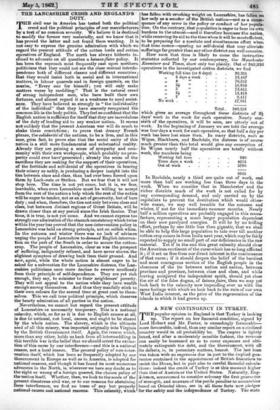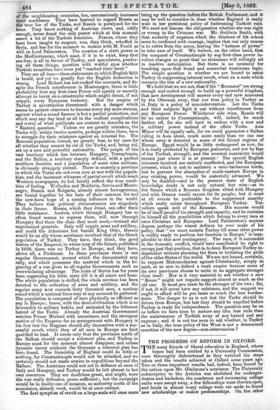A NEW CONTINGENCY IN TURKEY popular opinion in England is
that Turkey is looking up. The report on her financial condition, signed by Lord Hobart and Mr. Foster, is exceedingly favourable.— more favourable;.iiadeed, than any similar report on a civilized, country- would in all' probability be. The empire is lightly taxed., and after a. moderately sensible fashion, the revenue can easily be increased so as to cover expenses and ultii- mately extinguish the debt, and the Government, with. all' its defects, is, in. pecuniary matters, honest. The last loan. was taken with. an eagerness due in part to the implied gua- rantee contained in the appointment of British- financiers to, assist the Divan, but in part also to careful financial calcula- tions : indeed the credit of Turkey is at this moment higher than that of Austria.or the United States. Naturally, Eng- iiiihmen, accustomed to consider solvency the first guarantee. of strength, and unaware of the perils peculiar to monarchies, based on Oriental ideas, see in all these facts new pledges for the safety and the independence of Turkey.. The state • of the neighbouring countries, too, unconsciously increases their confidence. They have learned to regard Russia as the true foe of the Turks, and Russia is paralyzed for the hour. They know nothing of Austrian views, and, oddly enough, never dread the only power which at this moment wants a bit of the Turkish dominion. France, whom they have been taught to suspect, was, they think, rebuffed in Syria, and has for the moment to reckon with M. Fould as well as Lord Palmerston. The creation of a sixth power in the Mediterranean, which oust, if it is to exist, keep that sea free, is all in favour of Turkey, and speculators, ponder- ing all these things, question with wistful eyes whether Turkish securities have even yet "reached their level." They are all true—these statements on which English faith is based, and yet we greatly fear the English deduction is wrong. Lord Hobart has not cooked the accounts, and de- spite the French interference in Montenegro, there is little probability that any first-class Power will openly or secretly attempt to hurry on a catastrophe which might strain, if not cripple, every European treasury. But the empire of Turkey is nevertheless threatened with a danger which seems to patient observers to become every day more serious, against which a sound finance is but a partial protection, and which may any day land us all in the endless complications and worry of what publicists are content to describe as the "Eastern question." Unless we are greatly mistaken, the Turks will, within twelve months, perhaps within three, have to struggle for their existence against an internal foe. The Rouman population intend, we greatly fear, to try once for all whether they cannot be rid of the Turks, and, being rid, set up a new and powerful nationality. The people of the vast territory which lies between Hungary, Transylvania, and the Balkan, a territory sharply defined, with a perfect southern frontier, and a population of some nine millions, is obviously strangely stirred. There is scarcely a province in which the Turks are not even now at war with the popula- tion, and the incessant whispers of partial revolt which reach Western newspapers, do but faintly reflect the true condi- tion of feeling. Wallachia and Moldavia, Servia and Monte- negro, Bosnia and Bulgaria, already almost homogeneous, are bound together by the hate of their common foe and the new-born hope of a coming influence in the world. They believe that political circumstances are singularly in their favour. Russia, which they dread, can offer them little resistance. Austria, which through Hungary has so often found means to repress them, will now through Hungary find them the class they most need,—trained and experienced generals. Italy will supply arms and artillery, and could the Athenians but banish King Otho, Greece would be an ally whose assistance involved that of the G-reek population of Turkey. They have, they think, the good wishes of the Emperor, in whose map of the future, published in 1859, there was no Turkey in -Europe, and they have, above all, a Piedmont. In these provinces there is one regular Government, around which the discontented may rally, and which possesses the materiel which in the be- ginning of a war gives to all regular Governments such an overwhelming advantage. The ruler of Servia has for years been organizing his little state till it is all sinew and bone. The whole population is drilled, the whole revenue has been devoted to the collection of arms and artillery, and the regular army now exceeds forty thousand men, a nucleus round which a national force may at any moment be gathered. The population is composed of men physically as efficient as any in Europe ; brave, with the demi-civilization which is so favourable to military habits, and animated by the bitterest hatred of the Turks. Already the Austrian Government watches Prince Michael with uneasiness, and the strongest motive of the Emperor for an arrangement with Hungary is Ins fear lest the Magyars should ally themselves with a suc- cessful revolt, which they of all men in Europe are best qualified to lead. It needs only that the provinces north of the Balkan should accept a coherent plan, and Turkey in Europe must for the moment almost disappear, and unless dynastic terror misleads the Germans a coherent plan has been found. The friendship of England could do little or nothing, for Constantinople would not be attacked, and we certainly should not waste armies in expeditions beyond the Balkan. The Austrians could not act in defiance at once of Italy and Hungary', and Turkey would be left almost to her own resources. They are doubtless great, and might, were the war really defensive, prove sufficient ; but the campaign would be in reality one of invasion, as authority north of the mountains, already weak would be at once extinct; bring up the question before the British Parliament, and it may be well to consider in time whether England is really wise in her persistent policy of buttressing Turkish rule. We need not discuss the old question whether she was right or wrong in the Crimean war. Mr. Goldwin Smith, with that audacity of negation which the thinkers of his school seem to confound with courage, implies that our only course is to retire from the scene, leaving the "balance of power" to take care of itself. We believe, on the other hand, that the conquest of Constantinople by any first-class power in- volves changes so great that no statesman will willingly sit in inactive anticipation. But there is no necessity for touching upon that broad and somewhat wearisome topic. The simple question is whether we are bound to assist Turkey in suppressing internal revolt, when on a scale which menaces the rise of a new nationality. We hold that we are not, that if the " Roumans" are strong enough and united enough to build up a powerful kingdom, that new development will answer every end now answered by the Ottoman sway, that our true policy in Turkey as in Italy is a policy of non-intervention. Let the Turks and their subjects fight it out without interference from any European Power. Whichever side wins, Russia will be no nearer to Constantinople, will, indeed, be much farther off, for she will have to reckon with a new and a military power instead of the effete Turks. Asia Minor will be equally safe, for we could guarantee a Sultan ruling in Asia alone, much more easily than we can one whose sway is detested in some of the fairest regions of Europe. Egypt would be as little endangered as now, for it is really protected by European jealousies, and not by fear of the Turkish strength, and the nominal suzerainte would remain just where it is at present.' The special English interests involved are entirely unaffected, and the European interest, which is not to maintain a semi-barbarous horde, but to prevent the absorption of south-eastern Europe in any existing power, would be materially advanced. We may be doubful—and in the present state of English knowledge doubt is not only natural but wise—as to the future which a Rouman kingdom allied with Hungary and with Greece would secure for its people ; but it must at all events be preferable to the suppressed anarchy which really exists throughout European Turkey. Tra- vellers speak well of the Rouman. His success would be of itself proof of his strength and capacity, and he contains in himself all the possibilities which belong to every race at once Christian and European. Lord Palmerston's ancient dogma, perhaps the wisest defence he ever made of his policy, that "we must sustain Turkey till some other power is visibly ready to perform her function in Europe," is inap- plicable to this new contingency. The race, if it succeeded in the domestic conflict, would have manifested its right to occupy just that position, that is, to keep European Turkey in- dependent without alarming the fears or irritating the pride of the older States of the world. We are not bound, certainly, to support Mahomedanism against Christianity, simply as such, or to arm to defend a weak empire because some of its own provinces choose to unite in an aggregate stronger than itself. Nor is it very material to ask whether a new " Roum " might not require support almost as much as the old one. It must pro tan to be the stronger of the two ; for, if not, it will never have any existence, and the support we ought to afford will be pro tanto so much the less burden- some. The danger to us is not lest the Turks should be driven from Europe, but lest they should be expelled before Turkey is ready for independence. The question may be on us before we have time to mature any idea less rude than the maintenance of Turkish sway at any hazard and any expense ; and it is not too soon to ask whether, in Turkey as in Italy, the true policy of the West is not a determined assertion of the new dogma—non-intervention ?































 Previous page
Previous page